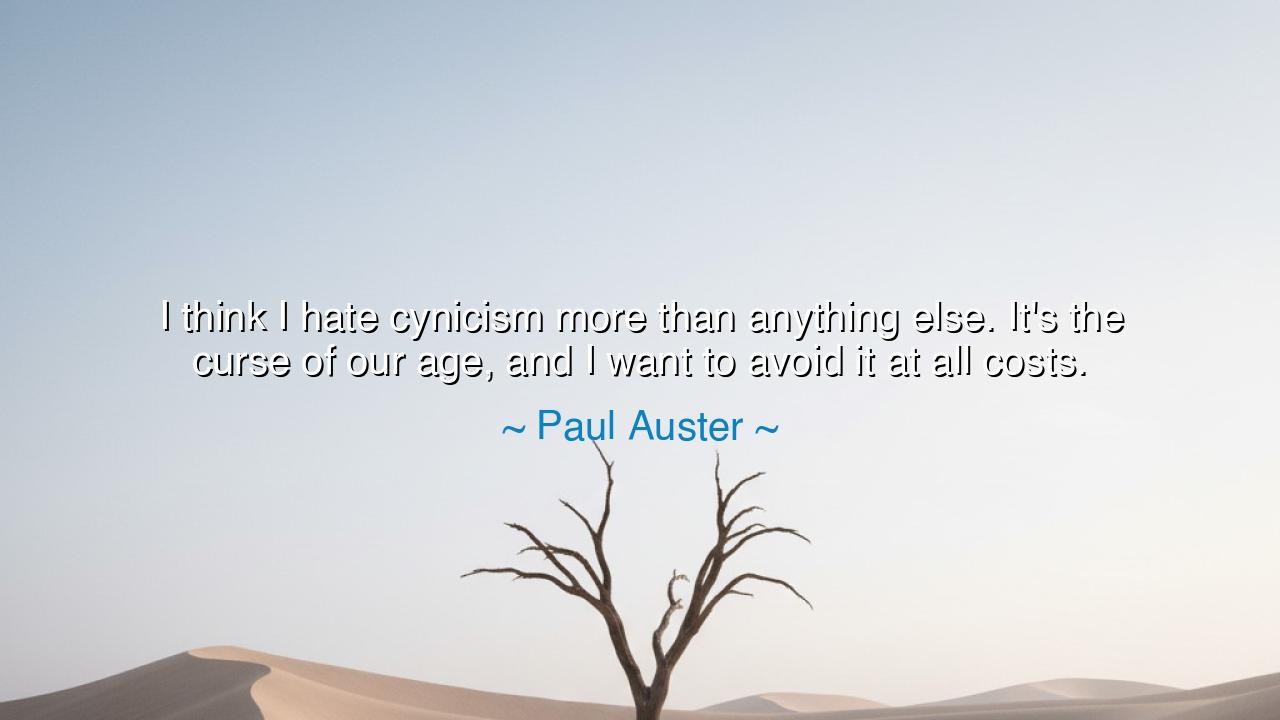
I think I hate cynicism more than anything else. It's the curse
I think I hate cynicism more than anything else. It's the curse of our age, and I want to avoid it at all costs.






“I think I hate cynicism more than anything else. It’s the curse of our age, and I want to avoid it at all costs.”
Thus spoke Paul Auster, the modern philosopher of solitude and chance, the storyteller of cities where fate and meaning still dance in uncertain light. In this confession, he does not merely denounce a mood—he condemns a disease of the spirit. For cynicism, that cold armor of disbelief, has become the shadow that follows the modern soul. Auster’s words are not angry, but sorrowful; they are a plea to preserve hope, that fragile ember which cynicism seeks to extinguish.
To understand his lament, one must first know the nature of this curse. Cynicism begins as disappointment—a wound born from seeing the falsehoods of the world too clearly. When innocence dies, the heart hardens; idealism turns to mockery, compassion to scorn. It is the defense of those who have loved and been betrayed, who have dreamed and been denied. Yet in its armor of irony, cynicism hides a greater weakness: the fear of believing again. It sneers at beauty so it cannot be hurt by it; it denies goodness so it cannot be deceived by it. Thus, the cynic survives—but no longer lives.
Paul Auster, who wandered through both the visible world and the inward labyrinth of the soul, saw how his age—our age—was drowning in this poison. The twentieth century had promised salvation through reason, progress, and technology, yet delivered war, greed, and emptiness. Out of this disillusionment rose a generation afraid to care. The cynic became its prophet, the skeptic its saint. But Auster, ever the seeker of meaning, refused this numbness. He understood that cynicism may protect the heart, but it also starves it. To live without faith—in love, in art, in humanity—is to dwell in a house without light.
Consider the life of Vincent van Gogh, a man who suffered more than most, yet never surrendered to cynicism. His world was cruel to him, his genius unrecognized, his soul often tormented. Yet still, he painted sunflowers. Still, he believed in the possibility of beauty. In the face of despair, he chose color and creation over contempt. That is the defiance Auster admires—the courage to believe when belief seems foolish, to love when love seems doomed, to create when the world no longer listens. Cynicism destroys creation, but faith—even wounded faith—renews it.
Cynicism, then, is not wisdom—it is decay mistaken for discernment. The wise see the world’s corruption and still choose to work toward goodness. The cynic sees the same truth but turns away, convinced that all effort is futile. It is easier, after all, to mock than to mend. But the ancients knew a higher path: that to live well is to act with hope, even when hope falters. As the Stoic Marcus Aurelius wrote, “Waste no more time arguing about what a good man should be. Be one.” So too would Auster say: waste no life despising the world—transform it, even in small and unseen ways.
Yet we must not hate the cynic; we must pity him. For beneath his laughter lies pain, and behind his indifference, fear. To heal the age of cynicism, one must first heal the hearts that have forgotten how to trust. This begins not with grand gestures, but with quiet acts: a kindness extended without expectation, an act of creation made without reward, a word of truth spoken despite derision. Every sincere gesture is a rebellion against the curse. Every moment of wonder is a victory over despair.
So, my children of this weary age, take heed of Paul Auster’s warning. Do not confuse intelligence with cynicism, or realism with despair. The world is broken, yes—but it is not beyond repair. The cynic sees the cracks and laughs; the wise see them and plant seeds in the soil between. Choose faith, not because it is easy, but because it is necessary. For when belief dies, the spirit follows.
Practical teaching: Guard your heart against the chill of indifference. When tempted to mock, choose to build. When the world feels hollow, fill it with the sound of your own goodness. Seek beauty even when others call it naïve. For in this time of darkness, those who still believe—even trembling—are the torchbearers of humanity. As Paul Auster knew, the only true cure for the curse of our age is not brilliance or strength, but the quiet, unyielding courage to hope again.






AAdministratorAdministrator
Welcome, honored guests. Please leave a comment, we will respond soon